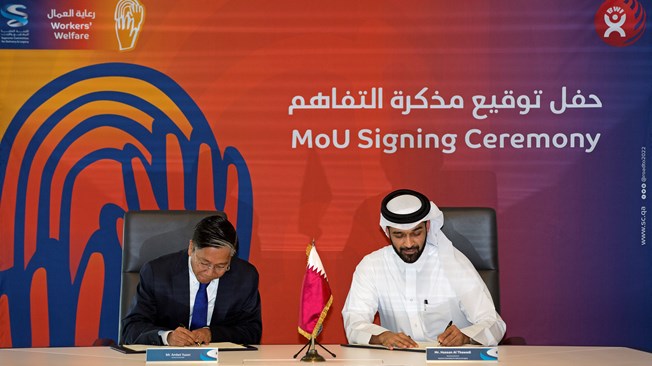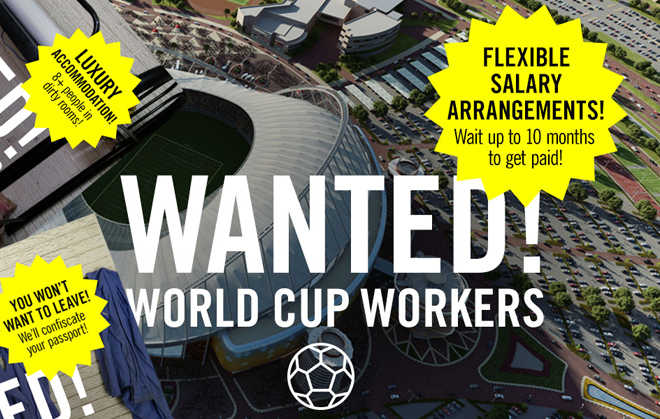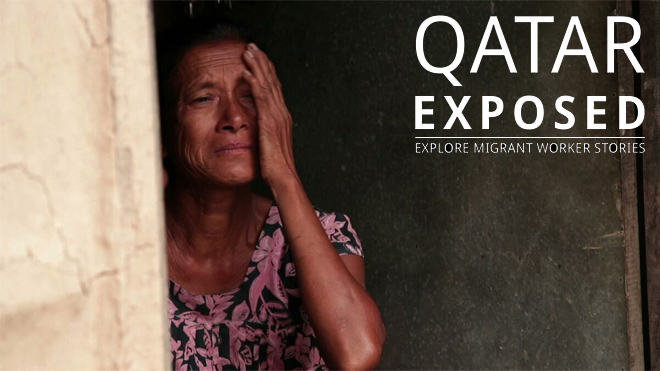Amnesty International has poured cold water on Qatar’s claims to be protecting workers on FIFA World Cup projects, exposing a litany of abuses faced by people refitting the Khalifa International Stadium in Doha. As Amnesty put it: “For players and fans, a World Cup stadium is a place of dreams. For some of the workers who spoke to us, it can feel like a living nightmare.”
Furthermore, the report shows the unreasonable distinction Qatar is making between World Cup and “non-World Cup” projects.
The report, which looked at the experiences of two groups of workers over the course of the last year, finds that despite claims that World Cup workers were benefiting from special protection, the usual problems of squalid accommodation, passport confiscation, illegal recruitment fees and deceptive payment practices affected them whether working inside or outside a stadium construction site.
It also cites several examples of employers continuing to ruthlessly exploit the country’s restrictive kafala laws to trap workers in the country, including seven men working on the Khalifa Stadium denied the right to return to help their families in the aftermath of the April 2015 earthquake in Nepal. This exploitation is being used to force workers to accept whatever other abuse is thrown at them. One worker told the researchers he’d bravely asked to go home because he hadn’t been paid. “The manager screamed at me saying ‘keep working or you will never leave!’”
Amnesty’s report points out that any company who uses this power to deny freedom of movement, for whatever reason, is denying a worker their human rights, even if it accords with local laws.
Qatar’s Supreme Committee for Delivery & Legacy, charged with the delivery of the World Cup, launched its Workers Welfare Standard to, essentially, protect workers from the inadequacy of the country’s own laws, but the same failures of enforcement are making the initiative ineffective as anything more than a PR exercise. For example, as the report says, “all of the accommodation of workers who had worked on the Khalifa Stadium … that was inspected by Amnesty International in 2015 was in clear breach of the Workers’ Welfare Standards.” Despite this the Supreme Committee admits that “no World Cup contractor has been penalised for breaching the Welfare Standards.”
Failures by both the government of Qatar and the Supreme Committee to police their own standards and laws are compounded by the continuing restrictions on non-Qatari workers forming and joining trade unions. Qatar is essentially wedded to a top-down inspection system, excluding the voice of workers on the ground, while refusing to resource it with enough money, staff or political will to succeed.
Of course, many of the problems faced by these workers are illegal in Qatar, but the authorities remain “apathetic” in the face of the problem. Qatar repeatedly promises new laws to fix problems highlighted by its critics, but still hasn’t even managed to stop employers confiscating workers’ passports, something that has been illegal for years. In terms of kafala, the law needs to be completely abolished, not amended, so that employers have no power over their workers’ movements. Qatar has refused to consider this.
These proposed new laws have been Qatar’s key defence as it faces off against the International Labour Organisation (ILO), which visited the country earlier this year and also found workers stranded in the country, sometimes unpaid for months, as well as more evidence of passport confiscation and terrible living conditions. The ILO has given Qatar 12 months to meet demands for meaningful reform and proper enforcement. The ILO, a UN agency made up of governments, employers and worker representatives, sets international labour standards to which Qatar – as an ILO member – should conform, but of which the retention of kafala in particular puts it in breach.
“Workers covered by the Welfare Charter can exchange a friendly wave with those who are not”
Even if the Welfare Standards were to be better enforced, one of the other key findings of the report is the fine line between what counts as an official World Cup project (covered by the Standards) and what does not. One of Amnesty’s two groups of workers were preparing not the Khalifa Stadium, but the landscaped area right outside it, ludicrously denied official status. Qatar has been arguing about what constitutes World Cup construction with a pedant’s zeal for months, but it seems even the grounds surrounding an official venue are just too far away from the action for them, meaning that workers covered by the Welfare Charter can exchange a friendly wave with those who are not as they all prepare the country to host the competition. It also means that Qatar’s strident claims that no one has been killed on an official project needs to be taken with a pinch of salt.
FIFA comes in for particular criticism for what the report describes as a total failure of due diligence – their responsibility to take steps to prevent abuse in the supply chain for their tournament. “FIFA’s continued failure to take any meaningful action on the issue of labour exploitation means that thousands of migrant workers involved in World Cup construction sites are at risk of exploitation,” says Amnesty, also calling on FIFA to start using its power to compel Qatar to remove employers’ control over workers’ moments to avoid the whole World Cup, and not just the construction, being riddled with human rights abuse.
FIFA has, as you might expect, rejected much of this criticism, claiming it “has been integrating human rights components in different aspects of its work, processes and activities for many years,” and conveniently ignoring the fact that whatever they were doing had demonstrably had very little impact on the experience of Qatar’s migrant workforce.
The report also demands that all companies working in Qatar, which includes some British companies, should follow a code of best practice rather than simply following Qatari law, including promising not to use kafala against their workers.
Despite the ILO investigation and the Amnesty Report showing the complete failure of Qatar’s legal system to protect workers and discourage abuse of their human rights, Qatar continues to cling to its cover story. Although professing “concern”, Qatar still insists “many of the points raised by Amnesty have already been addressed through recent legislative changes,” despite the report showing that legislation was having very little effect on the day to day lives of vulnerable workers.
Having laws is useless if they’re not enforced. It really is time for Qatar to play by the rules.
Amnesty has launched an online action to call on FIFA and its sponsors to take a tougher line in making Qatar act now to ensure the 2022 World Cup is not built on exploitation and misery.
This blog first appeared on Stronger Unions





